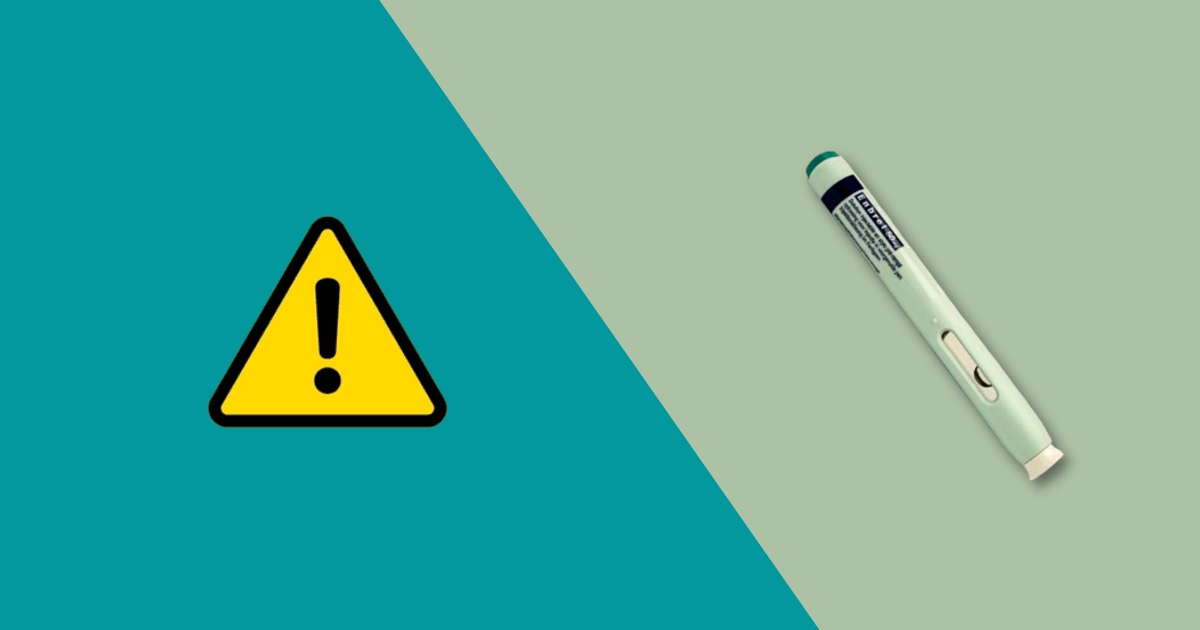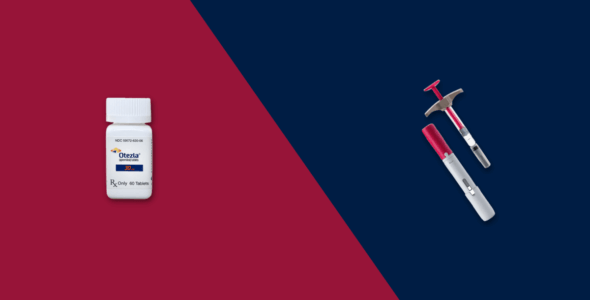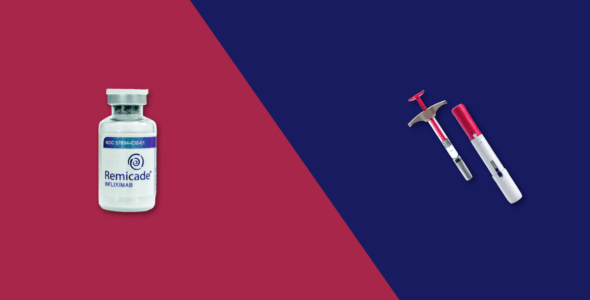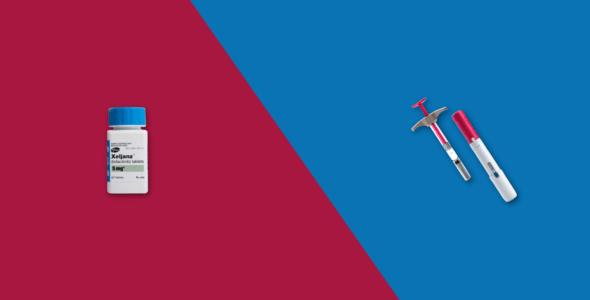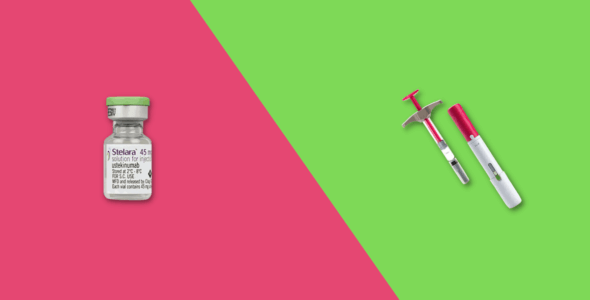Enbrel side effects and how to avoid them
Table of contents
Enbrel is an FDA-approved medication manufactured by Amgen. It is classed as a biologic and used to treat autoimmune diseases. While Enbrel is generally well tolerated, there are some potential side effects that people should be aware of. The most common side effects of Enbrel include injection site reactions and upper respiratory infections. Less common, but more serious side effects, can include new or worsening heart failure, and multiple sclerosis.
Learn more about the side effects of Enbrel and what you can do to avoid them.
What is Enbrel (etanercept)?
Enbrel contains the active ingredient etanercept. It is approved by the US Food & Drug Administration to treat the following autoimmune diseases:
- Moderate to severe chronic plaque psoriasis
- Psoriatic arthritis with or without methotrexate
- Moderate to severe rheumatoid arthritis with or without methotrexate
- Ankylosing spondylitis (inflammation of joints in the spine).
- Moderate to severe polyarticular juvenile idiopathic arthritis (joint pain and inflammation in children and adolescents with more than 4 joints affected)
Inflammation is a vital part of your immune system’s response to infection. It signals to your body to defend itself and that repair is needed. However, inflammation in healthy tissue, especially if it persists, can cause damage. Rheumatoid arthritis is caused by chronic inflammation in your joints, while ankylosing spondylitis is caused by chronic inflammation in your spine.
Enbrel helps treat autoimmune conditions by reducing inflammation. This helps to ease the symptoms of these diseases and limits the damage they can cause. Your immune system normally triggers inflammation by releasing a signaling molecule called TNF-alpha. This molecule attaches itself to areas inside your cells, beginning the process that causes inflammation. The active ingredient etanercept stops this from happening. It attaches itself to TNF-alpha molecules, stopping them from working. This halts the inflammation process before it’s even started.
Enbrel dosage
Enbrel is available as:
- 50 mg single-use prefilled syringe with 0.98 mL of a 50 mg/mL solution of etanercept
- 50 mg single-use prefilled SureClick Autoinjector with 0.98 mL of a 50 mg/mL solution of etanercept
- 25 mg single-use prefilled syringe with 0.51 mL of a 50 mg/mL solution of etanercept
- 25 mg multiple-use vial with 25 mg of etanercept
You are given Enbrel as a subcutaneous injection using either a pre-filled syringe or an injectable pen. It is important to use a new needle each time to prevent the risk of infection. You may get injection site reactions such as redness, bruising, or irritation after administration, but this will settle down after a few hours.
You are advised to read the medication guide provided with this medicine for the drug information and patient information and to speak with your healthcare provider for medical advice about any changes to your dose so they can monitor and evaluate your condition.
Enbrel side effects
The most common side effects of Enbrel include:
- Urinary tract infections
- Skin infections
- Injection site reactions
- Upper respiratory infections, sinusitis, and influenza
- Sore throat
- Headache
Enbrel can cause more serious side effects, including:
- Inflammation of the blood vessels
- Suppression of the immune system
- Increased risk of cancer, particularly lymphoma
- New or worsening heart failure
- New or worsening psoriasis
- Allergic reactions – swelling of your face, lips, tongue, or arms, itchiness and hives
- Serious infections
- Autoimmune hepatitis
- Multiple sclerosis or Guillain-Barré syndrome
- Pancytopenia (decreased levels of certain blood cells)
- Inflammatory bowel disease, such as ulcerative colitis
- Lupus-like syndrome – joint pain or swelling, feeling short of breath, skin rash on your cheeks or arms
Your doctor will test your blood to make sure you don’t have hepatitis B virus before you receive Enbrel, as this treatment can reactivate your infection.
If you experience any of these serious side effects, stop taking Enbrel and seek medical attention immediately. You are encouraged to report negative side effects of prescription drugs to the FDA. Visit www.fda.gov/medwatch, or call 1-800-FDA-1088.
Enbrel drug interactions
Enbrel can interact with other medications including:
- Anakinra
- Abatacept
- Sulfasalazine
- Live vaccines
- Cyclophosphamide
- Other immunosuppressants
Other medical conditions may affect your treatment with Enbrel so you should always seek medical advice from the healthcare professional prescribing your drugs.
Enbrel warnings & precautions
Don’t take Enbrel if you:
- Are allergic to the active ingredient etanercept
- Are allergic to any of the other ingredients in Enbrel
- Are at risk of developing a serious blood infection called sepsis
- If you have any kind of active infection
Talk to your physician before taking Enbrel if you:
- Have a history of recurring infections
- Have a history of congestive heart failure
- Have ever had cancer, such as lymphoma
- Have diabetes
- Have ever had tuberculosis, or have been in close contact with someone who has had tuberculosis
- Have ever had Hepatitis B or Hepatitis C
- Have nervous system problems such as multiple sclerosis
- Have optic neuritis (inflammation of the nerves in the eyes)
- Have transverse myelitis (inflammation of the spinal cord)
- Have blood disorders such as leukemia or anemia
- Suffer from seizures
- Are allergic to latex
- Are under 18 years of age (Enbrel is suitable for children, but varying age limits are recommended for different autoimmune diseases)
- Have been around someone with chicken pox
- Are pregnant, planning to become pregnant
- Are breastfeeding or planning to breastfeed – this medication passes into breast milk
You should always check with your doctor or pharmacist before taking any medication, including Enbrel, to make sure it is safe for you.
Other warnings you should know about
Serious infections and reactivation of infections have occurred in patients taking Enbrel. Infections include tuberculosis as well as fungal infections and infections caused by viruses or bacteria. Your healthcare provider should test you for tuberculosis before starting treatment and continue to monitor you closely before, during, and after treatment.
Unusual cancers have been reported in children and teenage patients using tumor necrosis factor (TNF) blockers before 18 years of age. Children, teenagers, and adults taking TNF blockers such as Enbrel are at an increased risk of developing lymphoma (fever, night sweats, weight loss, stomach pain or swelling, and swollen glands) and melanoma or non-melanoma skin cancers.
How to avoid Enbrel side effects
The best way to avoid side effects is to take Enbrel as directed by your doctor. Follow your doctor’s instructions carefully and do not take more or less than prescribed.
If you experience any side effects, talk to your doctor or pharmacist. They may be able to recommend ways to help reduce or prevent some of the side effects.
1. Stick to the recommended dosage
Take your prescribed dose of Enbrel that has been recommended by your healthcare professional. Do not take more or less than prescribed.
2. Monitor your blood sugar levels
If you have diabetes, it is important to monitor your blood sugar levels closely while taking Enbrel. Check your blood sugar levels as directed by your doctor and report any changes to your doctor immediately.
3. Drink plenty of fluids
Drink eight to 10 glasses of water or fluids every day to help prevent dehydration, which can make side effects worse.
4. Avoid alcohol
Drinking alcohol in excess can lead to alcoholic hepatitis. People with alcoholic hepatitis are at a higher risk of death from using Enbrel.
5. Don’t skip meals
Eating regular meals and snacks will help to prevent low blood sugar levels (hypoglycemia).
6. Check your feet
If you have diabetes, check your feet for any cuts, sores, or redness regularly. Tell your doctor if you experience any problems with your feet while taking Enbrel.
7. Know the signs and symptoms of Enbrel side effects
Signs and symptoms of side effects include infections, and injection site reactions. If you experience any of these symptoms speak to your doctor for medical advice.
8. Monitor your weight
If you have unexplained weight loss, it could be a sign of a serious infection with hepatitis B or tuberculosis caused by Enbrel. Speak to your doctor for medical advice if you experience any changes in weight.
9. Tell your doctor about all medications you’re taking
Be sure to tell your doctor about all other medications you’re taking, including over-the-counter drugs, vitamins, and herbal supplements, as they can interact with Enbrel.
10. Get regular medical check ups
It is important to get regular medical check ups and monitor your medical conditions. Your doctor will monitor your side effects and may adjust your dose of Enbrel as needed.
Medically reviewed
A medical professional has reviewed this article.


Jamie Winn, PharmD
Jamie Winn, PharmD
Dr. Jamie Winn received his Doctor of Pharmacy in 2002 from the University of South Carolina College of Pharmacy, Columbia, SC. Jamie is a medical reviewer for NiceRx.

